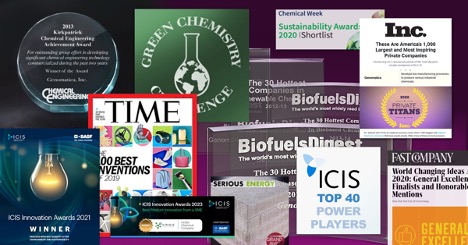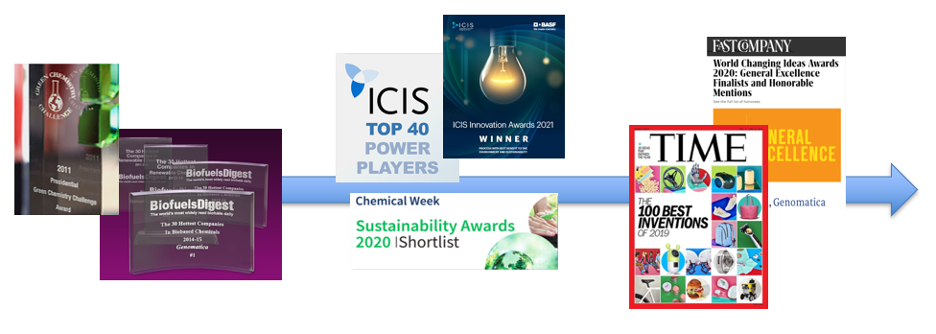And the Winner Is!… Using Awards to Win Customers and Investors
By Steve Weiss, co-founder of Grey Heron, and member of the Due Diligence Wolfpack
Special to The Digest

Want to get noticed by prospects, investors and press? And stand out from fifty companies using the same buzzwords? Win some awards.
This article speaks to the art and science of where awards fit in your overall strategy, and when and how to go after them. This topic is relevant to big companies and small. I’ll use multiple examples, both from companies I’ve worked with and others.
Awards sharpen your game
Let’s start with an underappreciated benefit: going through an award process is a great way to focus your messaging. As Matt Stewart says (EVP at Method Communications): “Awards focus you on a fundamental question – why does this company deserve to win an award? Craft a killer narrative and it’ll open many doors to customers and media – and might win an award too!”
Of course, awards are just one small piece of building a distinctive, differentiated, successful company or product line, but it’s a fun one, that people relate to – so it deserves a spotlight. To explore some broader issues, see my articles on fundraising, messaging and economics.
To start: decide what awards fit when
Awards can help during multiple parts of your commercialization journey. You just need to target the right awards and venues (publications or conferences) that match your objectives and progress.
Are you an early stage company looking to substantiate your technology credentials? Looking to be seen as a leader in your sector? Gain recognition in your target industries? Set the stage for mainstream, consumer and business press visibility? Planning who you want to influence, and when, will help you choose targets.
Let’s look at an example of applying this thinking over time. Take Geno (short for Genomatica), focused on more sustainable chemicals and materials. While still developing its first products, it was useful to bolster its technical credentials and visibility within its ‘home base’ of industrial biotech. So the company targeted – and won – the prestigious EPA Green Chemistry award (one of three they’ve earned); and was voted #1 Hottest in Renewable Chemicals by Biofuels Digest readers all four years that contest was held.

Example: strategic targeting of awards over time
Next, to build credentials with prospective partners and customers, Geno aimed at the business side of mainstream chemical companies. They proceeded to earn a series of innovation awards from ICIS Chemical Business (plus appearing on their Top 40 Power Players list), along with sustainability awards from Chemical Week.
More recently, Geno’s commercialization track record enabled them to extend visibility toward more mainstream audiences. Here, they’ve won recognition as a TIME magazine Best Invention (for plant-based nylon), and similar awards from Fast Company.
Your targeting process also needs to be realistic and well-timed. You don’t campaign for an Oscar award if you just appeared in your first role as a movie extra; and you don’t go for a local film award if you’ve just starred in your fourth superhero extravaganza. Do an impedance match, recognizing you can reach a little higher than where you objectively stand, but with somewhat lower odds of winning.
Quality counts: the right awards help you stand out to the right people
Some awards count much more heavily than others. Think about the ones that would build respect at your potential customers or investors.
In the renewables field, companies like Lanzatech are doing a good job of stringing together meaningful awards, including the TIME100 Most Influential Companies, Fast Company’s Most Innovative Companies, and the EarthShot Prize.
Another example is Geno’s Kirkpatrick award, from Chemical Engineering magazine. This award recognizes the most noteworthy chemical engineering technology commercialized anywhere in the world during the prior two years. It’s a big deal, and was achieved in synch with the company’s increasing conversations with the chemical industry.
And to address a question I get: some awards count less heavily. You know the ones I’m talking about – they feel like they’re pay-to-play, where you probably win if you pay an application fee. Don’t be fooled. Your customers and investors have a good sense of which awards are meaningful, and which are ‘less so’ – you build a reputation by winning the quality ones. The one possible exception here is if you’re in a category where all your competitors are displaying some of those other awards, in which case you might want one too.
Proven techniques to improve your chances of winning
Here are some tips to increase your chances, after you’ve gone through the identification, planning and sequencing process described above:
- Use plain language: Even in technical fields you’ll be well-served to use simple, clear language and avoid jargon.
- Be specific: Avoid buzzwords and virtue-signaling. Specificity is your friend, because it demonstrates that you’re real and credible. Describe tangible results, not just aspirational targets. Numbers help, but you’re not fooling anyone if you say you tripled your performance without noting your starting point.
- Lists are the new awards: This is another Matt comment – for example, Fortune’s 40 under 40. Your PR team can help build share of mind with the editors that build these (see below).
- Stand out from others: Time to get creative. For example, if there’s room for supplemental material – can you get the leaders in your field to provide signed, substantive letters of support? Can you give the judges a sneak peek at the world’s first (something) that you’re making?
- Reverse engineer previous winners: Look at previous winners; what they won it for; and how far along they were at the time. That should reveal a lot about the judges’ priorities, beyond any published criteria. Likewise, you can infer something about your chances: e.g., if they’ve only chosen companies that were public companies, or had more than X customers, etc.
- Use your PR team: Your PR team can be a great partner in this process. Often, people inside a company can capture a value proposition with precision, and the PR team’s experience and outside perspective ensure you’re addressing what the judges are looking for. Over time, as you meld with your PR team, they may take on more of the overall process.
The (right) awards are worth the effort
Are awards worth the effort? Some comments:
Randy Whitaker, CFO, Viridis Chemical: “Awards – like our ICIS innovation award – are a definite help in conveying the credibility of our offering.”
Jim Lane, publisher of Biofuels Digest, organizer of the Advanced Bioeconomy Leadership Conferences and of multiple awards: “Companies work hard to earn our awards. Their customers and investors want to know, talk to, and work with the winners. Awards consistently draw major audience interest.”
Reminder: awards are just one piece of the puzzle
I started this article by noting that awards are just one small piece of building a distinctive, differentiated, successful company (but a fun one, that people relate to).
Awards work best in concert with multiple other tools for gaining recognition, visibility and credibility – including your news flow, conference speaking appearances, thought leadership articles and more. Include awards in your planning to make it easy for people to see you as a leader.
Steve Weiss is co-founder of Grey Heron, a management and strategic marketing consulting firm. Since 1993, the firm has helped executives and investors at over 140 companies build value and become leaders in their sector, through strategy, fundraising, positioning and partnerships. Fields include climatetech, food, advanced materials, and cloud/SaaS/AI. Within renewable chemicals, materials and fuels, Steve has helped build a palm alternatives joint venture, Genomatica, Oberon Fuels, NovoNutrients, Beta Renewables and Liquid Light (acquired by Avantium), and is a proud member of the Due Diligence Wolfpack (watch our sessions on carbon capture, use and sequestration (March 2023), and pivots (October 2022)). Contact Steve at [email protected]; see Steve’s LinkedIn profile; listen to his “Science of Yes: Positioning and Messaging for Success”.
Category: Top Stories















